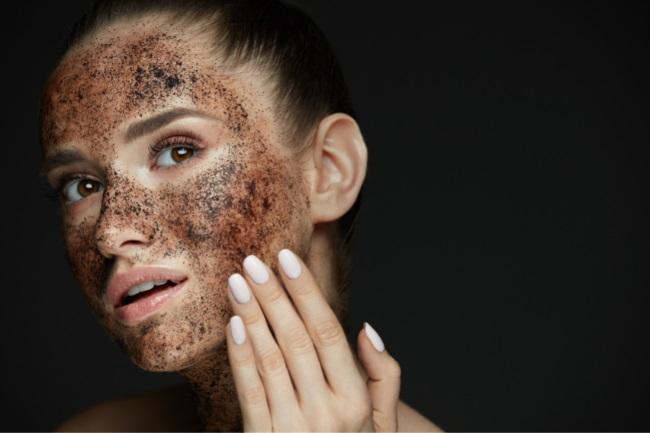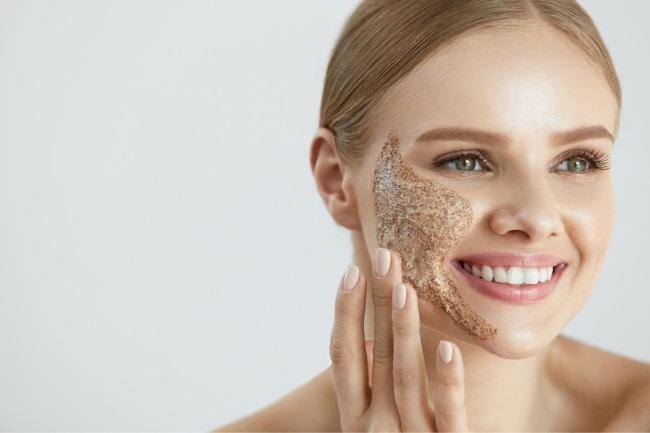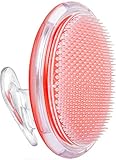It’s no secret that acne can be a difficult skin concern to deal with, and it’s easy to feel overwhelmed by the various claims and methods across the internet, especially when so many of them are unsuccessful. Could exfoliation be your new best friend? Let’s find out!
Does exfoliation help with acne?

To begin, the short answer to this question is yes, exfoliation can help with your acne, and it can actually be a handy method when combined with other skin-clearing techniques and performed correctly. If you’re searching for the next best way to aid your journey to clear skin, perhaps exfoliation could be one of your holy grails.
However, it is important that you understand all the information behind the technique of exfoliation for best results, as this can help you adjust your routine according to your skin. Not to mention, it’s important that you perform the process effectively and properly, to avoid any mishaps and complications along the way.
| Exfoliant Type | Description |
|---|---|
| Salicylic Acid | Deeply penetrates pores, unclogs and reduces sebum production |
| Glycolic Acid | Helps in exfoliation, promotes cell turnover and reduces acne scars |
| Lactic Acid | Exfoliates gently, helps in brightening and reducing acne marks |
| Enzyme Exfoliants | Derived from fruits, gentle exfoliation and suitable for sensitive skin |
In essence, exfoliation is a skincare process that uses either a chemical or mechanical product, which we’ll talk about a little more later, on the surface of the skin to smooth bumps and texture, as well as brighten your complexion. It is known to bring many benefits for the skin, as well as supporting clearing acne.
No matter which type of exfoliation you choose, the product will remove any of the dead skin cells on the surface of the outermost layer of the skin (the epidermis). These cells usually hang onto the skin after they are naturally shed in the process of cell renewal in the skin, but don’t serve any purpose once they’re already dead.
This means that, by removing the dead skin cells from the surface of your skin, you’re not causing it any harm, and you’re simply helping along a completely natural process that your body already follows.
| Skin Sensitivity | Recommended Exfoliation Frequency |
|---|---|
| Normal to Oily Skin | 2-3 times per week |
| Combination Skin | 1-2 times per week |
| Sensitive Skin | 1 time per week or every other week |
Once the dead skin cells have been removed from the surface of your skin, this automatically encourages your skin to renew its cells at a faster rate, which results in a fresher, brighter complexion as your skin cells are newer.
In terms of helping with your acne, this process of cell renewal is what allows your skin to clear in the first place. The regeneration of cells is responsible for the changing texture of your skin and, a pimple will leave your face faster when the skin cells in that area are regenerating faster.
In other words, exfoliation can speed up the speed at which your skin cells turnover, which leaves your skin clearer when you include other treatments in your routine.
Also read:
Does Exfoliating Remove Suntan? (Chemical vs. Physical)
The Best Way to Exfoliate your Lips (2 Methods)
Does exfoliation cause acne?

One question that many people have is whether or not exfoliation can cause acne in the first place. If this is the case, it’s definitely something you’d want to be aware of, and it would probably stop you from exfoliating your face in order to clear your acne.
One of the biggest misconceptions that the idea of exfoliation exacerbating your acne comes from is that exfoliation irritates the skin. It’s important to know that, if you are exfoliating your skin properly, and you’re not being overly harsh on it, there shouldn’t be a problem at all.
Of course, if you’re doing something that does happen to aggravate your acne and cause it to become irritated, your skin is more likely to flare up as a result, to defend itself. However, this won’t happen if you’re being gentle on your skin, which you should be, and so the answer is no, proper exfoliation won’t worsen your acne.
| Tips |
|---|
| Patch test new exfoliants before full use |
| Start with lower concentrations and increase gradually |
| Avoid aggressive scrubbing or harsh physical exfoliants |
| Follow with a gentle moisturizer |
| Use sunscreen during the day to protect the skin |
If you’re finding that your exfoliation method is causing irritation and resulting in more breakouts, re-consider the products you’re using, as well as thinking about how you’re exfoliating (we’ll talk about this later, too).
What is the difference between a chemical and mechanical exfoliator?
We have already mentioned the two terms of chemical and mechanical when concerning exfoliants, but what do they actually mean? They’re a way of categorising the products depending on their ingredients and how they work on your skin, and each of them brings its own advantages as well as disadvantages.
For a reference, a chemical exfoliator generally comes in a more liquid, and sometimes also more of a gel-like form, and it will use various acids, often AHAs (Alpha Hydroxy Acids) and BHA (Beta Hydroxy Acid) to work on your skin. these chemicals, along with others, breaks the bonds between your skin and the dead cells using chemical reactions, and aren’t anywhere near as harsh as they sound.
On the other hand, mechanical exfoliants are those which generally come in the form of a scrub and are massaged into the skin to mechanically exfoliate it and break the bonds between the dead cells and the skin physically, using force.
Generally, chemical exfoliating products are the best recommendation, and there are many reasons for that. One of them is, despite the slightly daunting name, they actually tend to be gentler on your skin than physical ones. Not to mention, they can often be more effective as they come in lots of different types of formulas, such as leave-on ones, so you can choose a product which is the perfect strength and formula to suit you.
- GENTLE NON-ABRASIVE LEAVE-ON EXFOLIATOR: with 2% BHA (Beta hydroxy acid) to unclog & diminish enlarged pores, exfoliate dead skin cells, smooth wrinkles & brighten & even out skin tone; Combats redness, wrinkles, aging, enlarged pores, & blackheads
- Dramatically improves skin's texture for radiant youthful even-toned skin; Beta hydroxy acid (BHA also known as salicylic acid) mimics the natural exfoliation process of younger skin by helping it shed extra layers while unclogging and clearing pores
- RAZOR BUMPS AND INGROWNS BE GONE - Dylonic ingrown hair brush stops ingrown hairs and razor bumps in their tracks! The ingrown hair brush as a pre-shave exfoliator for women and men.
- Double the function, double the results! Not only is Dylonic body exfoliator scrubber is chemical-free ingrown hair and but it also makes an excellent exfoliator!
- Achieve Softer, Healthier, More Radiant Skin – Experience the luxury of a Korean spa-style treatment from the comfort of home. Our Original Premium Exfoliating Mitt gives you the smoothest skin ever! Use this dead skin remover for traditionally deep exfoliation 2–4 times per month and you’ll enjoy improved skin texture, better product absorption, and fewer bumps & ingrown hairs, all while combating keratosis pilaris.
- Better than Loofahs or Chemical Exfoliants – Loofahs and chemical exfoliants don’t have the skin-gripping power of our Premium Exfoliating Mitts, meaning they’re not as effective at removing dead skin. Our body mitts are certified vegan and Halal, offering a naturally effective alternative – they’re rough enough to deeply exfoliate while soft enough to buff and smooth. Plus, our product packaging includes step-by-step instructions for customized results!
If you click Buy on Amazon and make a purchase, I'll earn a small commission at no additional cost to you.
How should I exfoliate to clear my acne?

As we’ve mentioned, it’s important that you exfoliate your skin properly when trying to clear your acne, as an incorrect and inefficient technique can only leave your skin worse than it was before, and no-one wants to end up in that situation. There are a few ways you can make sure that you’re exfoliating properly, so read on to discover them.
One of the most important factors to consider is the frequency of your exfoliation sessions, as not all skin is created equally, so some people’s skin may cope with more exfoliation than others. Generally, those with acne tend to have oily skin, so these people can usually exfoliate their skin two to three times per week to reap the benefits.
However, if you have dry acne-prone skin, sensitive skin, or you’re noticing that this is just too much for your skin to handle, consider backing down to once a week. It’s all about finding out what works best for you.
Another thing to keep in mind is the other way you’re exfoliating your face, as there may be more than one product in your routine that’s sneakily adding some exfoliation benefits, too. If you’re using a mildly exfoliating face wash, this is suitable for oily, acne-prone skin, however skin types which are drier or more sensitive may not be able to handle it. The same can apply for other products, too, such as serums and toners.
You should also be aware of the strength of the exfoliant you’re using, as this can vary amongst chemical exfoliants. Find something that’s not too strong for your skin, but equally strong enough to make a difference.
Tips for exfoliating to help with acne
If you’re feeling ready to start exfoliating your skin, that’s great! Before you do, it’s good to discover some quick, easy tricks and tips for the exfoliation process, in order to preserve your skin and keep it as healthy as possible.
Always use SPF afterwards

When you exfoliate you are removing the dead cells from the surface of your skin, which can make it look much fresher and brighter. However, one of the only downsides to exfoliation in general is that it can make your skin even more sensitive to UV rays. Because the skin underneath is newer, and doesn’t have the same protection from the old, dead cells, it is more susceptible to sun damage.
Of course, you should be using an SPF every day anyway, to protect your skin, but it’s particularly important post-exfoliation.
Also read: What is The Best Sunscreen with Zinc Oxide? (5 Recommendations)
Apply the product after cleansing, before any creams
Most chemical exfoliation products come in the form of some sort of liquid, such as a toner, or a leave-on masque. If the product you’re using is a leave-on treatment, there is one single most effective place to slot it into your routine, and that’s after your cleanser.
At this point, your face is completely stripped of any oils as well as any barriers such as creams and lotions, so the product can be most effective at its job and leave your skin as smooth as possible.
The best time to exfoliate is in the morning
While you can exfoliate at any time of the day, depending on what suits you, the best time is in the morning. This is because all of the dead skin cells have had the opportunity to loosen overnight, while your skin repairs itself, and this sets you up for an effective exfoliation. Plus, your skin will be freshly smooth and bright for the day ahead!
Final thoughts
While you may feel stuck for ideas when it comes to clearing your skin, there’s no need to feel stumped. Exfoliation is a great technique to implement into your skincare routine, and it’s a step in your regime that can be adjusted accordingly to suit your skin exactly.
As long as you remember to exfoliate properly to prevent damaging your skin, you can be sure to yield some great results, and even help to clear your acne!




